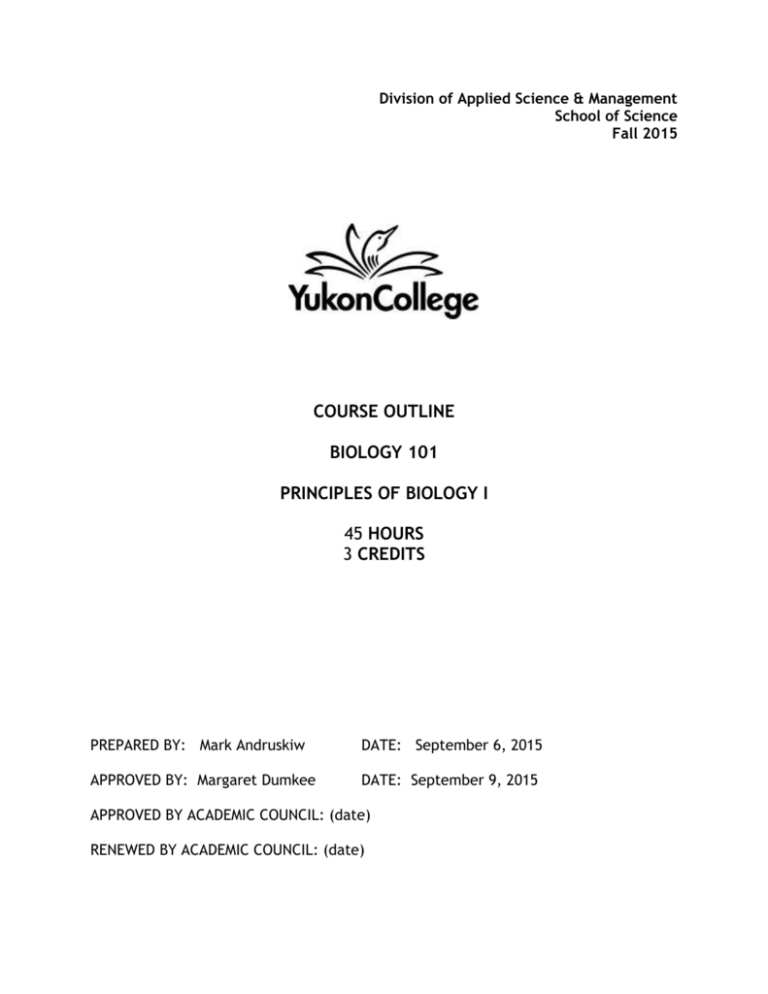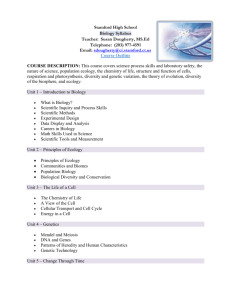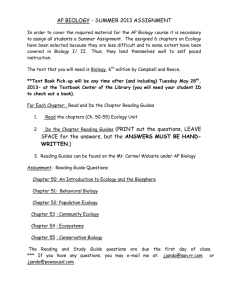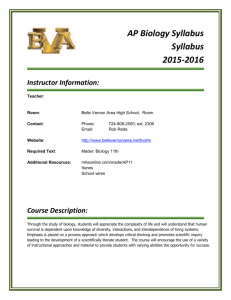
Division of Applied Science & Management
School of Science
Fall 2015
COURSE OUTLINE
BIOLOGY 101
PRINCIPLES OF BIOLOGY I
45 HOURS
3 CREDITS
PREPARED BY: Mark Andruskiw
DATE: September 6, 2015
APPROVED BY: Margaret Dumkee
DATE: September 9, 2015
APPROVED BY ACADEMIC COUNCIL: (date)
RENEWED BY ACADEMIC COUNCIL: (date)
YUKON COLLEGE
Copyright September, 2015
All rights reserved. No part of this material covered by this copyright may be reproduced,
utilized in any form, by any means, electronic, mechanical, traded, rented, resold, without written
permission from Yukon College.
Course Outline prepared by Mark Andruskiw, Sept. 6, 2015.
Yukon College
P.O. Box 2799
Whitehorse, YT
Y1A 5K4
2
DIVISION OF APPLIED SCIENCE AND MANAGEMENT
Biology 101, Principles of Biology I
Credit Course
Fall 2015
BIOLOGY 101, PRINCIPLES OF BIOLOGY I
INSTRUCTOR: Mark Andruskiw
OFFICE HOURS: Thursday 2:30 - 3:30
E-MAIL: mandruskiw@yukoncollege.yk.ca
OFFICE LOCATION:
LECTURE TIME: Tues & Thurs, 1:00 - 2:30
LECTURE ROOM: A2402
LAB TIME: Wed, Fri, 1:00 - 4:00
LAB ROOM: A2805 (Biology Lab)
COURSE DESCRIPTION
This course is a core introductory science course, transferrable to most Canadian
universities as a first-year level Biology course, emphasizing principles with wide
applications to all living organisms, including cell structure and function, mechanisms
of inheritance, the diversity of life, evolution, and adaptations to the environment. A
comparative approach to the unity and diversity of organisms is stressed. Weekly
mandatory lab sessions reinforce subject matter presented in lectures.
PREREQUISITES
Admission to the Division of Applied Science & Management. Biology 11 or equivalent
is highly recommended, and Biology 12 is recommended. Students who have not
successfully completed Biology 11 are generally not successful in this course.
Chemistry 11 is highly recommended. Math 12 (MATH 060 or other equivalent) is
strongly recommended either as a pre-requisite or co-requisite. Students are
expected to possess basic mathematical skills.
RELATED COURSE REQUIREMENTS
Mandatory Lab component BIOL 101L
3
EQUIVALENCY, TRANSFERABILITY
This course transfers as first-year biology (one semester) to most Canadian
Universities. Please see the BC Transfer Guide or contact the School of Science for
more information on transferability.
LEARNING OUTCOMES
Upon successful completion of the course, students will demonstrate knowledge and
understanding of the following:
1. General Biology Learning Outcomes
The steps taken in rigorous scientific process and what defines a living
organism, including knowledge of the 8 unifying themes of living organisms
2. Ecology Learning Outcomes
Levels of study in ecology and examples of new properties that emerge at each
level; factors that determine and influence distribution of life on Earth based
on climate; define concepts of habitat, fitness, regulation, niche; concepts of
population ecology such as sample, density, dispersion, mark-and-recapture,
and growth models; interpretation of life tables and survivorship curves;
knowledge of life histories
Structure and dynamics of communities, including types of interactions and
how they influence growth models and diverse adaptations that exist as a
result of community dynamics; trophic structures; concepts of species
diversity, keystone species, disturbance; primary and secondary succession;
invasive species
Ecosystem structure and dynamics, including primary production and nutrient
cycling
3. Evolution Learning Outcomes
Observations and main inferences of Charles Darwin such as concepts of
evolution, natural selection, mutation; sources of evidence for evolution;
application of Hardy-Weinberg equilibrium; causes of evolutionary change
(microevolution); patterns of change in phenotypes resulting from natural
selection (macroevolution); causes of speciation; concept of hybridization and
reproductive isolating mechanisms
4. Diversity of Life Learning Outcomes
Overview of taxonomic groups and the origin of species; unifying characteristics
and basic knowledge of the diversity within the following taxonomic groups:
prokaryotes and the two main kingdoms within, protists and the five main
4
groups within, fungi, plants and evolutionary patterns from non-vascular to
seedless vascular to seed plants, evolution and adaptations in angiosperms,
animals and evolutionary patterns from invertebrates, protostomates, and
segmented animals, to deuterostomates, and to chordates; the challenges of
life on land for both plants and animals
5. Chemical Basis of Life Learning Outcomes
Unique properties of water that allow it to support life; basic understanding of
chemical bonds, molecules, and atoms, and the elements that make up living
things; classes of most commonly found compounds found in living things and
common functional groups
6. Cell Structure and Function Learning Outcomes
General cell structure; organelles and their structure and functions; differences
in cell structure among taxonomic groups; functions of proteins in the cell;
communication between cells; function of membranes; energy use and basic
steps in metabolism by the cell; control and use of enzymes; mechanisms of
transport at the cellular level
Cellular respiration, redox reactions, and ATP (energy) production
Photosynthesis, light pigments, and production of high energy compounds
Lab Learning Outcomes
Upon completion of mandatory lab sessions students will demonstrate knowledge
of basic ecological practices such as estimating population size and density,
complete basic statistical exercises, recognize sources of evidence for evolution,
identify general groups of bacteria based on shape, differentiate between
prokaryotic and eukaryotic cells, recognize cells of fungi and protists, and
recognize the diversity within Kingdom Protista. Students will demonstrate
correct procedures of microscopy using both compound and stereomicroscopes,
including the ability to use oil immersion and preparation of their own wet mount
slides with live organisms. Students will demonstrate the practical knowledge
necessary to conduct dissections of several invertebrate organisms, including
clams, roundworms, segmented worms, crayfish, insects, sea stars, and one
(optional) vertebrate, frogs. Students will also be able to identify organelles
within cells and conduct basic laboratory tasks such as incubation of test tube
cultures in a water bath.
COURSE FORMAT:
Three hours of lecture, three hours of lab, and zero hours of tutorial per week.
5
ASSESSMENTS
Attendance & Participation
Attendance is mandatory in labs, and greatly encouraged in lectures. A student
may be withdrawn from a course if a percentage (as stipulated in Yukon College
Academic Regulations and Procedures) of scheduled contact hours are missed.
Absence from labs results in a zero grade assigned for assignments and quizzes
relevant to the missed lab. If the instructor is notified in advance of potential
problems with attendance, alternate work can be arranged.
Students must attend the laboratory session assigned to them once per week.
Assignments
LAB ASSIGNMENTS
Assignments are handed out at the beginning of laboratory sessions and graded on
the basis of understanding and applying principles involved, as well as the
correctness of answers to solutions. Most students finish assignments during the
lab session, although they are not due until the next week day. A quiz will be
given during each scheduled lab to assess progress. Written reports may also be
assigned.
Tests
Quizzes on lecture material are given approximately once every two weeks. There
are 5 quizzes in total, worth 10% each, and a final exam worth 15% of the total
grade. The final exam will cover the entire course. The final exam will be held at
the end of the term, and the date will be announced as soon as confirmed by
administration. Quizzes on laboratory material are given every lab session (except
the first) and cover material from the lab exercises the week before. There is no
final exam for the laboratory portion of the course.
EVALUATION
Lecture quizzes (5 @ 10% each)
50 %
Lecture final exam
15 %
Lab assignments
17.5 %
Lab quizzes
17.5 %
Total
100 %
Students must pass the lab and lecture portions of the course independently.
6
REQUIRED TEXTBOOKS AND MATERIALS
Urry, Cain, Wasserman, Minorsky, Jackson, and Reece. (2014) “Campbell, Biology In
Focus”. Pearson, Benjamin Cummings.
Available for purchase in the bookstore
OR
Reece, Urry, Cain, Wasserman, Minorsky, and Jackson. “Campbell, Biology”.
7th, 8th, 9th Edition. Pearson, Benjamin Cummings.
Lab Manual: assembled by instructor and handed out during first lab session
ACADEMIC AND STUDENT CONDUCT
Information on academic standing and student rights and responsibilities can be found
in the Academic Regulations:
http://www.yukoncollege.yk.ca//downloads/Yukon_College_Academic_Regula
tions_and_Procedures_-_August_2013_final_v1.pdf
PLAGIARISM
Plagiarism is a serious academic offence. Plagiarism occurs when students present
the words of someone else as their own. Plagiarism can be the deliberate use of a
whole piece of another person’s writing, but more frequently it occurs when
students fail to acknowledge and document sources from which they have taken
material. Whenever the words, research, ideas of others are directly quoted,
paraphrased, they must be documented according to an accepted manuscript
style (e.g., APA, CSE, MLA, etc.). Resubmitting a paper which has previously
received credit is also considered plagiarism. Students who plagiarize material for
assignments will receive a mark of zero (F) on the assignment and may fail the
course. Plagiarism may also result in dismissal from a program of study or the
College.
YUKON FIRST NATIONS CORE COMPETENCY
Yukon College recognizes that a greater understanding and awareness of Yukon
First Nations history, culture, and journey towards self-determination will help to
build positive relationships among all Yukon citizens. As a result, to graduate
from ANY Yukon College program, you will be required to achieve core
competency in knowledge of Yukon First Nations. For details, please
see www.yukoncollege.yk.ca/yfnccr.
7
ACADEMIC ACCOMMODATION
Reasonable accommodations are available for students requiring an academic
accommodation to fully participate in this class. These accommodations are
available for students with a documented disability, chronic condition, any other
grounds specified in section 8.0 of the Yukon College Academic Regulations
(available on the Yukon College website). It is the student’s responsibility to seek
these accommodations. If a student requires an academic accommodation,
he/she should contact the Learning Assistance Centre (LAC) at (867) 668-8785,
lassist@yukoncollege.yk.ca.
TOPIC OUTLINE
Lab schedule
DATE
LAB #
SUBJECT
Sept. 16, 18
1
Ecology 1 - The Boreal Forest: Introduction to Ecosystems (Outside)
Sept. 23, 25
2
Ecology 2 - Population Ecology and Community Interactions (Outside)
Sept 30, Oct 2
3
Evidence for Evolution, Evolution and Natural Selection
Oct. 7, 9
4
The Microscope, Diversity of Life 1 - Archaea, Eubacteria, Protists
Oct. 14, 16
5
Fungi and Plant Diversity 1 - Seedless Plants
Oct. 21, 23
6
Plant Diversity 2 - Seed Plants
Oct. 28, 30
7
Animal Diversity 1 - Sponges, Cnidaria, Flatworms, Roundworms, Rotifers
Nov. 4, 6
8
Animal Diversity 2 - Molluscs, Annelids
Nov. 11, 13
-
Remembrance Day (no labs this week)
Nov. 18, 20
9
Animal Diversity 3 - Arthropods, Echinoderms, Chordates
Nov. 25, 27
10
Chemistry of Life - Water
Dec. 2, 4
11
Cell structure and function
8
Lecture schedule
SUBJECT
TEXT
TOPIC
Introduction
CH 1
Biology, scientific method
Ecology
CH 40
Population ecology
CH 41
Community ecology
CH 42
Energy flow
Evolution
CH 19, 21
Variation & natural selection
CH 22
Speciation
CH 23
Taxonomy, diversity
CH 24
Prokaryotes
CH 25
Protists
CH 26
Fungi
CH 26
Plants
CH 27
Invertebrates
CH 27
Vertebrates
CH 2
Inorganic chemistry, water
CH 3
Organic chemistry
CH 4
Cell structure & function
CH 5
Cell membranes
Metabolism
CH 6
Enzymes, energy flow
Respiration
CH 7
Glycolysis, citric acid cycle
Photosynthesis
CH 8
Diversity of Life
Chemistry of Life
Cells
QUIZ (approx.)
Quiz 1 - Sept. 24
Quiz 2 - Oct. 8
Quiz 3 - Oct. 22
Quiz 4 - Nov. 5
Quiz 5 - Nov 19
9







